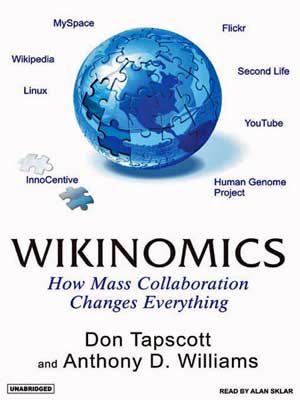|
MLMUGers occasionally read something other than displays
[ home
| reviews
| bylaws | library ]
This site has many more reviews, all written by MLMUG members.
View all our book reviews. Or, view our
Software, hardware, and game reviews.
An AudioBook Review
by Moe Comeau
 |
Title: Wikinomics: How Mass Collaboration Changes Everything
Author: Don Tapscott and Anthony D. Williams; read by: Alan Sklar
Price: $4.65 - $39.99, depending on format; Free rental via download from Chester County Library using
Overdrive.
ISBN: 1591841380
Media: Digital download, 376.2 MB.
Interest Level: Intermediate
Overall Rating: 4 out of 5
|
Please note that the version offered via Overdrive is the first edition, published in September 2006, so it is somewhat out of date given the subject matter. It has been re-released and updated many times, including a sequel "MacroWikinomics: Rebooting Business and the World" in September, 2010. All versions are heavily supported online, true to the book's espoused concept of "mass collaboration."
But it is that same out-of-date-ness that has led me to write this review, as will become clear below. Things move fast in our wiki world.
Content:
According to the authors the word "wiki" means "quick" in Hawaiian, consistent with the quickly changing world of Internet togetherness, AKA global collaboration, and how this changes many of the basic business concepts once considered inalterable. What has precipitated those changes is Web 2.0, which makes anyone with a browser a potential contributor, instead of a passive receptor. The obvious example is Wikipedia, the online encyclopedia written, compiled, edited and re-edited by "ordinary people," resulting in a better product than one encyclopedia company could ever produce, given the huge difference in the potential number of contributors.
The book emphasizes a seemingly outlandish recommendation — companies should share, sell, or rent their intellectual property, instead of zealously guarding it. In so doing, some amazing new ideas often come from the populace at large, benefiting both the owner and a new partner. It gives many examples of successful sharing, which would never have been possible were it not for "the wisdom of crowds."
Strengths:
The authors expound on the virtues of Web 2.0 concepts, that until now had eluded me. Take, for example, blogs. "The vast new wilderness of voices adds more noise to an overly saturated media environment." My sentiments exactly — a flea market — 1% gems and 99 % trash." Not so, say the authors; that argument is trite. Aggregation via RSS, blog search engines and other tools make it much easier to find those gems.
Decentralization allows for intelligent collaboration, resulting in a sort of global brain, much more powerful than one individual's. Tagging allows readers to apply metadata, making that data discoverable by powerful search engines like Google. Open source allowed an entire operating system — Linux — to become a reality. Old barriers have vanished, resulting in such things as Amazon overtaking Barnes & Noble, E-trade competing with JP Morgan, and eBay being launched from a San Jose living room.
Weaknesses:
Some of the claims in the book seem to border on hyperbole. "This may be the birth of a new era, perhaps even a golden one, on par with the Italian renaissance, or the rise of Athenian democracy." Erm, probably not; remember Segway?
Alan Sklar's readership skills left me underwhelmed. He uses lots of inflection, but often on the wrong words in the sentence, in my opinion.
Comments:
The part of the book that jumped out at me was a prediction about our favorite computer/music/media/mobile devices company. After much discussion about Apple's obsession with keeping the iPod family proprietary, they state:
Only Steve Jobs knows for sure where Apple wants to take the iPod next. The company has already entered the portable video market in a big way. Analysts speculate that Apple may use upcoming generations of the iPod to move into the mobile phone market as well.
Ah, how backward we were back in '06!
Summary:
Wikinomics is well-written, easy to listen to, and contains real-world examples of how collaboration is changing the face of business. It may get bogged down in detail at times and, coupled with the narrator's mis-inflections, become slightly boring. Nonetheless, it is well worth the read/listen for the wealth of insight it contains.
|
|


